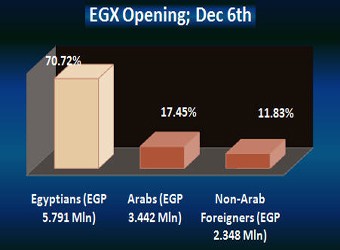Amid the clashes erupted between pro-and-against Egyptian President Mohamed Morsi demonstrators , the Egyptian Exchange (EGX) has posted on Thursday’s opening session massive losses of around EGP 9 billion as the capital market has amounted to EGP 342.179 billion, according to data compiled by Amwal Al Ghad at 11:01 a.m. Cairo time (09:01 GMT).
The EGX indices opened in dark red.
The main index, EGX30 sank by 4.33% to 4852.64 p. EGX20 dived by 4.16% to 5523.34 p.
Meanwhile, the mid- and small-cap index, the EGX70 pushed down by 2.84% to 430.3 p. Price index EGX100 tumbled by 3.48% to 720.64 p.
Clashes between supporters of President Mohamed Morsi and his opponents which started on Wednesday night have left five dead and 450 injured, according to the health ministry.
This was after trading in 116 listed securities; 86 declined; while 30 keeping their previous levels.
The non non-Arab foreigners and Arabs’ opening selling transactions have triggered EGX’s losses as they were net sellers 11.83% and 17.45% respectively, of the total markets, with a net equity of EGP 2.348 million and EGP 3.442 million excluding the deals.
On the other hand, Egyptians were net buyers seizing 70.72% of the total markets, with a net equity of EGP 5.791 million excluding the deals.
Presidential Palace Clashes:
Hospitals in the Heliopolis area continued to receive casualties of gunshots and rock throwing into the early hours of Thursday morning.
El-Hosseini Abul-Deif, a journalist at El-Fagr newspaper, is one of those who were shot and was critically injured during the clashes and doctors at the Zahraa Hospital believe his chances of survival are slim.
The executive board of the Journalists’ Syndicate has blamed the leadership of the Muslim Brotherhood for the attack on El-Hosseini and also held President Morsi responsible for failure to ensure public security.
Meanwhile, a total of six presidential advisers have resigned from their posts to protest President Morsi’s recent decrees and what they saw as inability to resolve the current political crisis.
The president’s chief of staff, Refaa Tahtawi, told reporters on Thursday morning that President Morsi will address the nation sometime later in the day.
“There will be no return to the past, yet, there will be moves to the future,” Tahtawi said without giving details on what measures the president intends to announce to deal with the crisis.
Meanwhile, Sobhi Saleh, a leading Brotherhood figure and a former MP, who was attacked by anti-Morsi protesters in Alexandria on Wednesday night, told reporters that “revolutionaries should be ashamed of themselves because the Brotherhood are the most noble people.”
Late on Wednesday night, Zaghloul El-Bulshi, the newly appointed head of the election commission, which is set to organize the upcoming referendum on the constitution set for 15 December, resigned from his post saying that he refuses to monitor “a vote that spilled Egyptian’s blood.”
According to the official state news agency, MENA, the Egyptian presidential guard deployed tanks on Thursday morning at the presidential palace, where the clashes have been taking place since Wednesday afternoon, to maintain order.
At 4pm on Wednesday, hundreds of supporters of President Morsi attacked anti-Morsi protesters with truncheons in an attempt to disperse a peaceful protest against the recently issued constitutional declaration, which gives the president the power to override the country’s judiciary.
Two hours later, anti-Morsi protesters descended on the palace to protest the attacks before escalations ensued.


